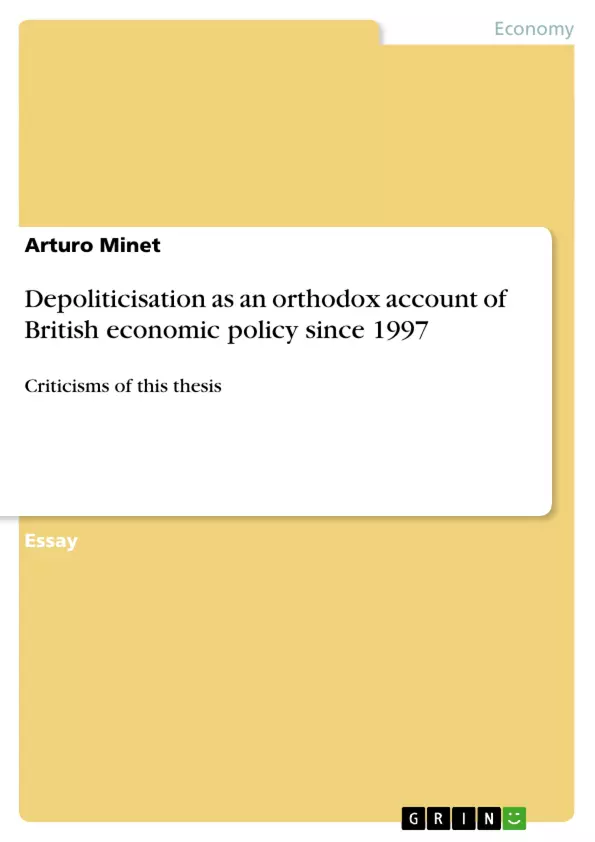Only a few authors have yet dealt with the interesting development of depoliticisation that is taking place not only in Britain, but also in many other democracies all over the world. In this essay we are going to focus ourselves on the British case, where the change of government in 1997 seems to have intensified the depoliticisation movement. To give a comprehensive picture of the actual debate in the literature on depoliticisation we will review the work done so far by Peter Burnham, Jim Buller and Matthew Flinders. Both papers, Burnham (2001) and Buller & Flinders (2005), try to stimulate debate and research on a political phenomenon that seems not to be new but nevertheless worth to discuss if we want to understand the rationale guiding present British policy.
Inhaltsverzeichnis (Table of Contents)
- INTRODUCTION
- WHAT IS DEPOLITICISATION?
- DEPOLITICISATION IN BRITAIN SINCE 1997
- DEPOLITICISATION: AN ORTHODOX ACCOUNT OF BRITISH ECONOMIC POLICY?
- WHAT CRITICISMS CAN BE MADE OF THIS THESIS?
- CONCLUSION
Zielsetzung und Themenschwerpunkte (Objectives and Key Themes)
This essay examines the phenomenon of depoliticisation in British economic policy since 1997. It explores the rationale behind this shift, analyzes its application in the context of New Labour's policies, and critically evaluates the arguments for and against depoliticisation as a governing strategy.
- The definition and characteristics of depoliticisation
- The historical context and evolution of depoliticisation in Britain
- The role of depoliticisation in shaping economic policy under New Labour
- Criticisms and limitations of the depoliticisation thesis
- The potential consequences of depoliticisation for democratic accountability
Zusammenfassung der Kapitel (Chapter Summaries)
- Introduction: This chapter provides an overview of the essay's topic and sets the stage for the subsequent analysis. It introduces the concept of depoliticisation and its relevance to the study of British economic policy since 1997. It also highlights the key authors and works that will be examined in the essay.
- What is depoliticisation?: This chapter defines and explains the concept of depoliticisation as a governing strategy. It explores its theoretical underpinnings, drawing on the work of Peter Burnham and other scholars. The chapter examines how depoliticisation can be used to manage economic and social processes, influence market expectations, and enhance government credibility.
- Depoliticisation in Britain since 1997: This chapter analyzes the specific forms and manifestations of depoliticisation in Britain since the Labour government came to power in 1997. It considers the decision to grant operational independence to the Bank of England as a key example of depoliticisation. The chapter also explores the historical precedents for depoliticisation in British economic policy, including the return to the gold standard in 1925 and the joining of the ERM.
- Depoliticisation: An Orthodox Account of British Economic Policy?: This chapter examines the extent to which depoliticisation has become an established and accepted account of British economic policy since 1997. It explores the arguments that have been put forward in support of this thesis, highlighting the perceived benefits and advantages of depoliticisation. It also considers the potential limitations and shortcomings of this view.
Schlüsselwörter (Keywords)
This essay explores the key concepts of depoliticisation, economic policy, governing strategies, political economy, New Labour, Bank of England, operational independence, market expectations, and democratic accountability. It analyzes the historical development of depoliticisation in Britain, focusing on the period since 1997.
Frequently Asked Questions
What is depoliticisation in economic policy?
Depoliticisation is a governing strategy where politicians move decision-making powers to independent bodies to manage economic processes, influence market expectations, and enhance credibility.
What major change happened in British economic policy in 1997?
In 1997, the New Labour government granted operational independence to the Bank of England, a prime example of depoliticisation.
Why do governments choose to depoliticise certain areas?
It is often used to "bind the hands" of future governments, reduce the perceived influence of partisan politics on the economy, and signal stability to global markets.
Are there historical precedents for depoliticisation in Britain?
Yes, historical examples include Britain's return to the gold standard in 1925 and the joining of the European Exchange Rate Mechanism (ERM).
What are the main criticisms of the depoliticisation thesis?
Critics argue that it can lead to a "democratic deficit" by removing important economic decisions from the direct accountability of elected officials.
- Arbeit zitieren
- Arturo Minet (Autor:in), 2006, Depoliticisation as an orthodox account of British economic policy since 1997, München, GRIN Verlag, https://www.grin.com/document/77358



